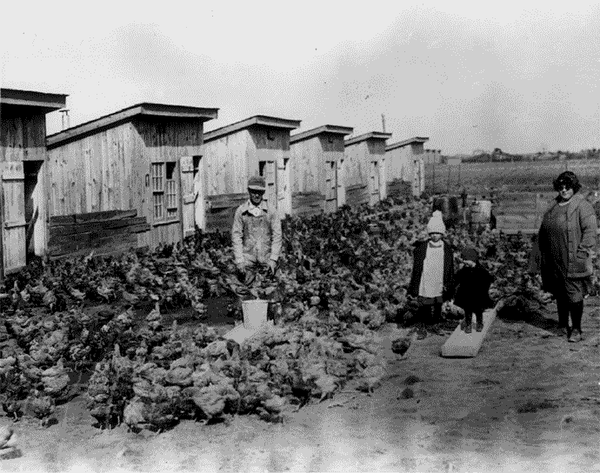
Good Shepherd Conservancy — The Origins of Factory Farm Poultry
In 1923, most chicken keepers had small backyard flocks that primarily produced eggs for the family and perhaps a few neighbors or a local store. That was Cecile Steele’s intention when she ordered 50 baby chicks for her home flock in the Delmarva Peninsula. But much to her surprise, she received 500 birds!
Instead of protesting, Cecile decided to raise the large flock in her modest chicken coop. A few months later, she sold the 387 that survived at a tidy profit. Within three years, Cecile was raising tens of thousands of birds annually, and hundreds of other Delmarva farms started to copy her model. Thus a new way of raising poultry, along with a new agricultural model, was born.

The “factory farming” method made chickens markedly cheaper and more profitable than ever. Cecile Steele became very wealthy as a result of this, continuing the venture until her tragic early death in 1940.
While these early factory farms were large for their time, compared to the mega poultry houses of today, they were practically pasture-raised operations. Over time, producers pushed this model further and further while also applying it to all other farming sectors.
Cecile Steele did not seem to mistreat her birds or raise them in a particularly egregious way. She remains an inspiration to me. Someone that made the best of a bad situation and ended up building a better life for herself and her family. Little did she know that she would inspire a factory farm industry that would treat animals as poorly as it does today.
Today, Delmarva remains one of the largest poultry-growing regions of the United States. Perdue, Allen Harim, and Mountaire Farms are all based out of the region, raising hundreds of millions of birds annually.
While this new intensive method of raising the birds made them somewhat cheaper, they remained just as expensive as beef and still nowhere as popular. But then in the 1940s came an idea to breed a bigger, better chicken—an idea that would have an even greater impact on poultry than Cecile ever did.
The Good Shepherd Conservancy is a non-profit organization dedicated to safeguarding and promoting biodiversity through the use of Standardbred poultry and historical purebred lines of livestock for agricultural use. Their goal is to re-shape the poultry industry, pushing it away from the sad, industrial nature of it as it stands today. The organization was founded by the one and only Frank Reese, Jay Greenberg — an aspiring Standardbred poultry farmer, educator, and a notable humane butchery expert —and Patrick Martins — Heritage Foods founder. Please consider donating today so we can provide nothing less than the country's only commercial alternative to the factory farm poultry system.
